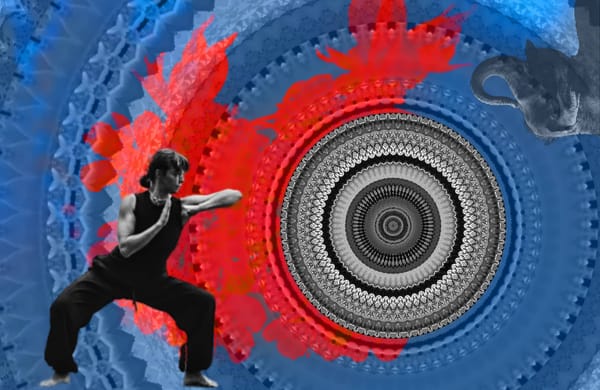The Integrity of Virtue - De
A man of the highest virtue does not keep to virtue and that is why he has virtue.

In the constellation of concepts that shaped ancient Chinese thinking about human flourishing, few are as profound yet misunderstood as De (德). While Western translations often render it simply as "virtue," this reduction obscures something far more nuanced—De is the integrity of virtue, the authentic power that emerges when one's inner nature aligns with the cosmic order.
To understand De properly requires examining how different schools of Chinese philosophy approached this fundamental concept. Rather than being a static moral quality imposed from without, De represents a dynamic relationship between the individual and the underlying patterns that govern both human society and the natural world.
Effortless Authenticity
The Daodejing presents perhaps the most paradoxical understanding of De in Chinese literature. Chapter 38, which opens the second half of the text devoted to virtue, begins with a startling claim. The original Chinese reads: 上德不德,是以有德 (shàng dé bù dé, shì yǐ yǒu dé). Different translators have rendered this in various ways:
Arthur Waley (1958): "The man of highest virtue does not keep to virtue and that is why he has virtue."
Stephen Mitchell (1988): "The Master doesn't try to be powerful; thus he is truly powerful."
D.C. Lau (1963): "A man of the highest virtue does not keep to virtue and that is why he has virtue."
This isn't mere wordplay—it points to something essential about the nature of authentic power.
When someone must constantly announce their honesty, their generosity, their spiritual attainment, the very need for such declarations reveals their absence. True De operates differently. It manifests naturally, without self-consciousness or effort to impress. The farmer who tends his fields with complete attention to the needs of each crop, season after season, develops an intuitive understanding that no agricultural manual can convey. His success comes not from following rigid rules but from years of patient observation that have attuned him to subtle patterns of weather, soil, and plant behavior.
This is why the Daodejing describes the sage as acting through wu wei—not through forceful intervention, but by creating conditions where natural processes can unfold. The master teacher doesn't force understanding into students' minds but creates an environment where curiosity naturally arises. They ask the right question at the right moment, offer a story that illuminates rather than explains, or simply maintain a quality of attention that invites deeper thinking.
The text offers a concrete example: "The highest good is like water, which benefits all things and does not compete." Water doesn't struggle against the mountain; it finds the spaces between rocks and gradually transforms the landscape. A skilled negotiator operates similarly, finding points of natural agreement rather than forcing confrontation, allowing solutions to emerge from the situation itself rather than imposing predetermined outcomes.
The Natural Development of De Through Wu Wei
When someone begins practicing wu wei, they rarely set out to develop De—such intentional pursuit would contradict both concepts. Instead, De emerges as an unexpected byproduct of consistently aligning actions with natural rhythms.
How Wu Wei is Practiced: Wu wei develops through simple but consistent shifts in daily response. Instead of immediately reacting to situations, pause and observe what the circumstances actually require. When someone criticises you, notice the impulse to defend and instead listen for any useful information. When problems arise, resist the urge to force quick solutions—sit with the situation until the natural response becomes clear. In conversations, speak only when your words add genuine value rather than filling silence or proving points.

The practice involves learning to work with existing conditions rather than against them. The parent who discovers their child learns better through movement stops forcing desk-based study and finds educational activities that use the child's natural energy. The manager who notices team members' individual strengths stops trying to make everyone identical and creates roles that utilise what each person naturally offers.
Over months of such responses, something shifts. The gardener who works with their soil conditions rather than fighting them finds neighbors asking for advice. The teacher who responds to students' actual interests rather than pushing predetermined lessons discovers classes become more engaged. This isn't strategy but the natural result of accumulated wu wei choices.
The Paradox of Cultivation
All the classical texts emphasise the importance of cultivation while simultaneously suggesting that the harder one tries to be virtuous, the further one moves from authentic virtue. This isn't contradiction but recognition of fundamental truth about human development.
Genuine confidence can't be manufactured through positive self-talk; it emerges naturally from competence developed through practice. Similarly, authentic virtue can't be produced through willpower alone but must arise from gradual transformation of one's entire approach to living.
The classical texts suggest this transformation happens through what might be called "indirect cultivation"—engaging wholeheartedly in practices that gradually reshape character without explicitly aiming at virtue as a goal. The Analects emphasises study of classical literature, music, and ritual not as mere academic subjects but as means of developing sensitivity to harmony, proportion, and proper relationships.
A musician who practices scales daily isn't thinking about virtue, yet the discipline of regular practice, attention to precision, and patience with gradual improvement cultivates qualities that extend far beyond musical performance. The gardener who tends plants with careful attention to their individual needs develops observational skills and patience that influence how they relate to people.
The Daodejing points toward practices of simplicity and contentment. This might mean regularly choosing less rather than more—taking only what food you actually need, buying only what you'll actually use, speaking only what adds value to conversation. Such practices gradually reduce the internal noise of excessive desire, creating space for clearer perception of what situations actually require.






